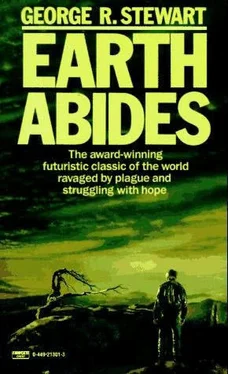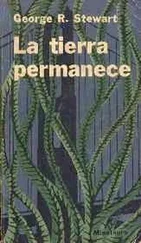So he went eastward through Oklahoma, the country empty everywhere. On the rolling hills the scrubby oak-growth looked just as it must have looked before. On the level cultivated stretches, corn and cotton were growing. The corn stood high, head above the weeds; it would bear a fairly good crop. But the cotton was rapidly being choked out.
The full heat of summer was upon him now, and was breaking down more of his remnants of civilization. He still shaved daily, more because he felt comfortable that way than for any sense of his appearance, but he had not had his hair cut, and it hung shaggily about him. He hacked at it with a pair of scissors. He had reverted merely to a pair of blue jeans and an open-necked shirt. He threw the shirt away every morning, and put on a clean one. Somewhere he had forgotten his gray fedora, and from an Oklahoma general store he picked up a cheap straw hat, the kind that any tenant farmer might wear in the summer.
That afternoon he crossed into Arkansas, and though he knew that state lines were only imaginary, he suddenly be came conscious of another change. Here all the dryness of the plains country was left far behind, and the weather was hot and humid. As a result the growth was everywhere pushing in upon the roads and buildings. Runners from vines and climbing roses already dangled across windows and hung swinging from eaves and porch roofs. The smaller houses looked as if they were shrinking back shyly and beginning to hide in the woods. Fences also were being obscured. There was no longer a sharp line between the road and the surrounding country. Grass and weeds were showing green at every little crack in the concrete; blackberry shoots were pushing in from the shoulders, breaking the clean white line. In one place the long runners of some ivy reached clear to the white line in the middle of the pavement, and met others advancing from the other side.
Peaches were ripe, and he varied his diet of canned food by raiding an orchard. His entry scared off a few hogs which had been eating the fallen fruit. That night he slept at North Little Rock.
The prize boars will die in their well-kept pens, and the fat brood sows will wander about, squealing for their mash, but on many a farm, the shoats will run wild without restraint of fences. They need nothing from man. In the heat they seek the swamps by the river, and root there, and lie in the mud, grunting happily. When the air grows cool, they wander the oak woods and feed on the acorns. After a few generations, they grow slimmer of leg and thinner of body and longer of tusk. Before the fury of their boars, even the wolf and the bear hurry aside. Like man, they eat flesh or fowl or tuber or nut or fruit. They will live.
An hour on the road next morning, at the edge of a small town, he started, as his eyes fell upon the unaccustomed sight of a well-weeded and tended garden. He stopped, went to investigate, and found for the first time what might, by generous interpretation, be called a social group. They were Negroes—a man, a middle-aged woman, a young boy. By the obvious look of the woman, there would soon be a fourth member. They were timid. The boy kept in the background, curious but frightened, scratching at his head in a way that suggested lice. The woman stood, stolidly silent except to direct question. The man took off his straw hat and stood fingering its broken rim nervously; beads of sweat, from nervousness or the heat of the morning sun, ran down his shiny black forehead.
Ish could hardly understand the thick dialect, rendered more unintelligible by embarrassment. He made out, however, that they knew of no one else in the neighborhood, and in fact knew very little of anything, not having been beyond walking distance from the spot since the disaster. They were not a family group, but merely a chance association of survivors—three, against the law of chance, having survived in one small town.
Ish soon realized they were suffering not only from the shock of the catastrophe but also from the taboos carried over from before it. They talked with diffidence in the presence of a strange white man, dropping their eyes.
In spite of their obvious reluctance, Ish looked around their place. Although all the houses of the town must have been open to them, they still lived in the crude cabin where the woman had lived before the disaster. Ish did not go in, but through the open door he saw the rickety bed and chairs and the sheet-iron stove, and the oil-cloth-draped table with the flies buzzing about the uncovered food. The outside looked better. They had a luxuriant garden and a good corn-patch, and were actually tending a small field of cotton, although what in the world they expected to do with the cotton was more than Ish could figure out. Apparently they had merely carried on, doing the things that people in their world were supposed to do, and thus gaining a sense of security.
They had chickens in a pen, and some pigs. Their painfully naive embarrassment when Ish saw the pigs was only too plain advertisement that they had appropriated them from some farmer’s pen and now felt that the white man would hold them accountable.
Ish asked for some fresh eggs, and for a dozen gave them one of his dollar bills. They seemed to be delighted with the exchange. After a quarter of an hour, having exhausted all the possibilities of the situation, Ish got into the car, much to the relief of the reluctant hosts.
He sat in the front seat for a moment, thinking to himself, “Here,” he reflected, “I might be a king in a little way, if I remained. They would not like it, but from long habit they would, I think, accept the situation—they would raise vegetables and chickens and pigs for me, and I could soon have a cow or two. They would do all the work that I needed to have done. I could be a king, at least, in a little way.”
But the idea was only fleeting, and as he drove on, he began to think that the Negroes had really solved the situation better than he. He was living as a scavenger upon what was left of civilization; they, at least, were still living creatively, close to the land and in a stable situation, still raising most of what they needed.
Of half a million species of insects only a few dozen were appreciably affected by the demise of man, and the only ones actually threatened with extinction were the three species of the human louse. So ancient, if not honorable, was this association that it had even been used as an argument for the single origin of man, anthropologists noting that all isolated tribes scratched and picked at the same parasites and therefore inferring that the original ape-men must have carried the original insect-ancestors outward with them from their point of dispersal.
Since that first departure, throughout hundreds of millennia, the lice had adjusted their life nicely to their world, which was the body of man. They existed as three tribes, taking as their domains, respectively, the head, the clothing, and the private parts. Thus, in spite of racial differences, they amicably maintained a tripartite balance of power, setting for their host an example which he might well have followed. At the same time, becoming so exactly adapted to man, they lost the capacity of existing upon any other host.
The overthrow of man was therefore their overthrow. Feeling their world growing cold, they crawled off in search of some new warm world to inhabit, found none, and died. Billions perished most miserably.
At the funeral of Homo sapiens here will be few mourners. Canis familiaris as an individual will perhaps send up a few howls, but as a species, remembering all the kicks and curses, he will soon be comforted and run off to join his wild fellows. Homo sapiens ,however, may take comfort from the thought that at his funeral there will be three wholly sincere mourners.
Читать дальше












